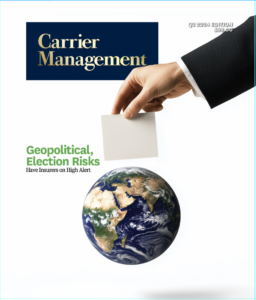AI is the latest tool in a trend of bad actors trying to spread misinformation to alter opinions, sow discontent or erode trust during election cycles, said Kellam Radford, senior vice president and national programs underwriting leader at DOXA Insurance.
Related article: Underwriting in a Politically Charged Climate
“AI provides accessibility, adaptability and ability to generate large quantities of believable content at a relatively low cost,” he said. “There have already been examples of this technology at play during the 2024 election cycle.”
Indeed, NPR reported in May that Steve Kramer, a Democratic political consultant, faced a federal fine and criminal charges for commissioning a robocall that used artificial intelligence to impersonate President Joseph Biden. The call was sent to thousands of people in New Hampshire on the eve of the state’s January primary discouraging Democrats from voting.
Politico also reported in July that an investigation by the British television station Channel 4 found evidence of more than 400 instances of digitally altered deepfake pornography of more than 30 high-profile U.K. politicians ahead of the country’s July 4 elections.
“The potential for weaponizing emerging deepfake technology is of growing concern,” said John Farley, managing director of the cyber practice at Gallagher. “Impersonations of political leaders and high-ranking government personnel could not only sway election outcomes. They can also lead to widespread geopolitical conflict.”
While AI is increasing the threat landscape, Radford said it can also be a powerful force to detect and respond to cyber events.
“There is an opportunity for insurance carriers to work with their clients to proactively share information that can help mitigate emerging risks. Additionally, there exist potential opportunities for insureds to more dynamically share feedback and changes in their exposure beyond the traditional exchange of information at renewal,” he said. “[AI] too has the potential to be a major asset for underwriters in their risk assessment arsenal based on its adaptive and exploratory nature to process copious amounts of continually evolving data to evaluate risk. Insurers should use modeling capabilities including the evaluation and utilization of third-party tools.”
As the insurance industry has historically endured global conflicts and catastrophic events, he said cyber-related events are part of this evolution.
“While the nature of risk has and will continue to evolve, cyber underwriting will also require better tools and proactive insights to assess and mitigate risk, evolution of coverage, greater transparency and co-operation between clients, brokers, carriers, vendors and regulators,” he said. “New technologies that emerge through conflicts are also likely to spur greater innovation and more tailored insurance solutions and coverage offerings in response to specific insurer needs.”
***
 This article is featured in Carrier Management’s third-quarter 2024 magazine, “Election Year Geopolitical Risks.“
This article is featured in Carrier Management’s third-quarter 2024 magazine, “Election Year Geopolitical Risks.“
Related articles include:
- Underwriting in a Politically Charged Climate
- Predictive Model Delivers Insights as Insurers, Reinsurers Brace for More Civil Unrest
- Managing Your Team in a Polarized World
All of the articles in the magazine are available on the magazine page of our website.
Click the “Download Magazine” button for a free PDF of the entire magazine.
To be able to read and share individual articles more easily, consider becoming a Carrier Management member to unlock everything.





















 Flood Risk Misconceptions Drive Underinsurance: Chubb
Flood Risk Misconceptions Drive Underinsurance: Chubb  Allianz Built an AI Agent to Train Claims Professionals in Virtual Reality
Allianz Built an AI Agent to Train Claims Professionals in Virtual Reality  Earnings Wrap: With AI-First Mindset, ‘Sky Is the Limit’ at The Hartford
Earnings Wrap: With AI-First Mindset, ‘Sky Is the Limit’ at The Hartford  What Analysts Are Saying About the 2026 P/C Insurance Market
What Analysts Are Saying About the 2026 P/C Insurance Market 






